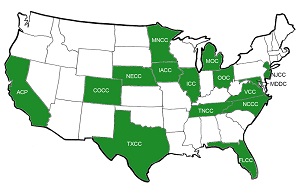State Bills Roundup-Chapter State Advocacy
Print this Article | Send to Colleague
 With the leadership of USCC’s chapters, this year so far has seen a mixed bag of legislation benefiting compostable labeling contamination reduction, Extended Producer Responsibility bills that include the compost industry, compost use and on-farm composting. Some wins and some partial wins were recorded as legislatures reached their Sine Die (ending).
With the leadership of USCC’s chapters, this year so far has seen a mixed bag of legislation benefiting compostable labeling contamination reduction, Extended Producer Responsibility bills that include the compost industry, compost use and on-farm composting. Some wins and some partial wins were recorded as legislatures reached their Sine Die (ending).
Colorado: The session just ended had the COCC heavily invested in the work on these two successful bills:
- SB253 Standards for Products Represented as Compostable disallows, as of January 2024, any producer of a plastic product not certified compostable from using words, labeling or images to imply compostability – giving teeth to the ability to stop “look alike” products from contaminating the composting stream. Product certified by a third-party organization must show the logo, display the word compostable on all products except those exempted as “small,” and use green labeling or striping to make it easily recognizable by consumers.
- Organics Diversion Study: This bill passed calling for a study, to be completed by August 1 2024, requires a state study of the impacts, benefits and feasibility of requiring organic material diversion from landfills. The state must also develop an infrastructure plan with help to local governments, as well as end market opportunities.
Maryland: Three bills of interest passed in the session that ended this spring:
- On Farm Composting: SB62 increased the permit exemption from state regulation for on-farm composting from 5,000 square feet to 10,000 square feet for active food scrap composting. Members of the MD-DC Composting Council, the Institute for Local Self-Reliance and Maryland’s Clean Water Action worked together to move the bill forward.
- Compost Use: HB586 requires state agencies to include specifications for compost (as well as mulch and other soil amendments, added to the bill late in the session) online for state agencies to use. Early on the bill was focused on compost and required agencies to provide a purchasing preference, but that was stricken from the bill in late days of the session.
- Extended Producer Responsibility: Originally a second years’ try at an EPR bill, it was modified to require a Needs Assessment by July 30 2024 and for the Maryland Department of Environment to approve a single producer responsibility organization by Oct. 1, 2023. A few compost-relevant highlights of the needs assessment are evaluation of current infrastructure and capacity for collecting, hauling and processing compostable materials; increasing organics recycling in the State; coordination of local government education of consumers on organics recycling, and contamination reduction and organics recycling infrastructure
Michigan: Permitting Regulations overhaul under the watchful eyes of the chapter:
- Known as Part 115, the Natural Resources and Environmental Protection Act, Solid Waste, passed the NATURAL RESOURCES AND ENVIRONMENTAL PROTECTION ACT As a result, Michigan counties will be rewriting their Solid Waste Management Plans, and compost facilities will now fall into one of several categories with new regulations (https://www.michigan.gov/-/media/Project/Websites/egle/Documents/Programs/MMD/Compost/Facilities-FAQ.pdf?rev=6b985cfadb1e4960bef513d69881efce)
North Carolina: Advocates are pushing for tax relief for farmers who purchase compost in the
S582 The North Carolina Farm Act, which would exempt qualifying farmers from paying sales tax on compost purchases.

